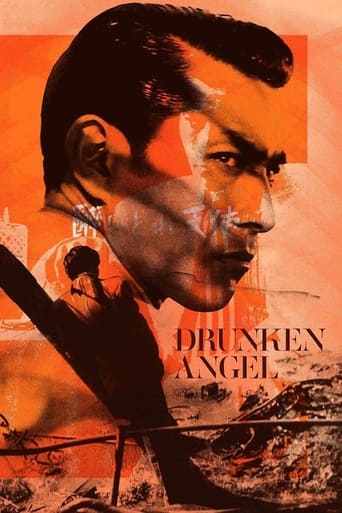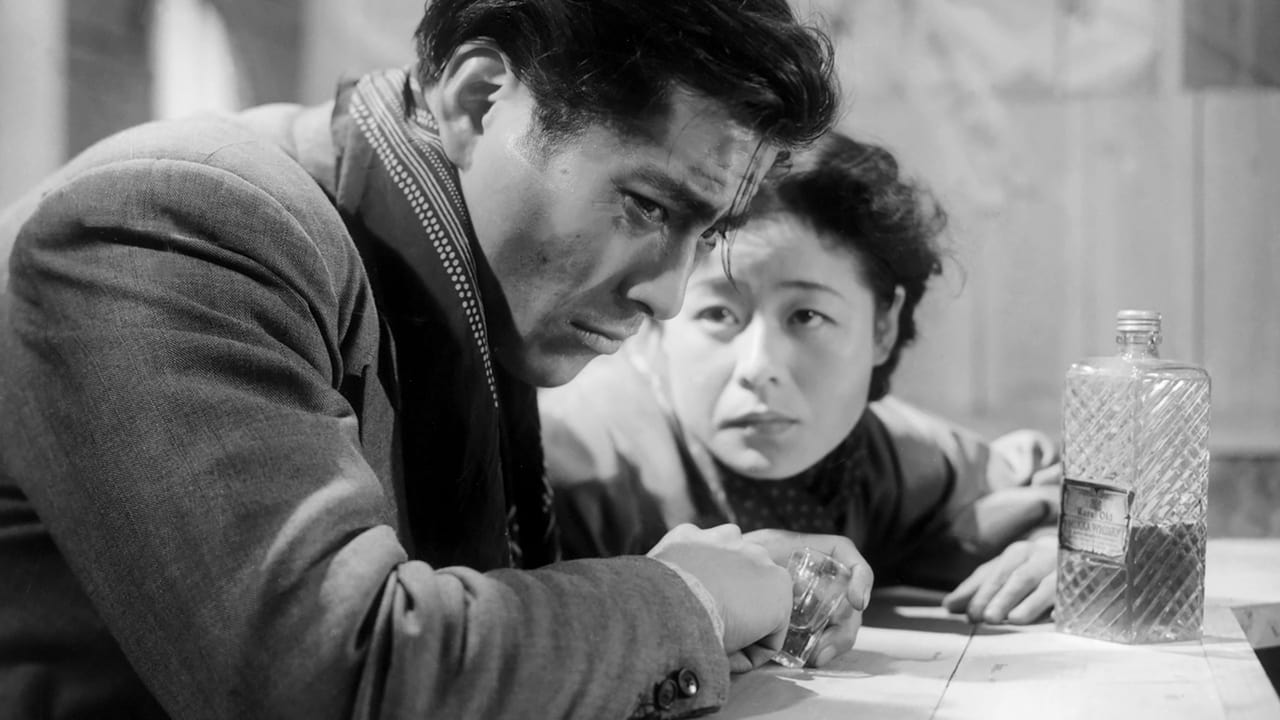elvircorhodzic
DRUNKEN ANGEL is a symbolic name for a melodrama. The director, who is willing to experiment and mix styles. The story is woven with several philosophical aspects. This is a very successful combination of noir and neo-realism. The characterization is superb. The doctor, who is prone to alcohol and grumpy young gangster are the main protagonists. The doctor wants to treat. Gangster wants to enjoy life. A vicious disease connects them. The drama develops into a dark and brutal atmosphere. One character tries to control another. The symbolism of the conflict. What is actually true evil and how it should be treated? The truth is superficial. In this case, patients treated Society.The director made such a construction in which all is somehow sick. The man does not fight against corruption and social injustice, but against their own will power. I ask myself again. What should be treated? The problem is bigger than a drunken doctor, sick hooligan, unfaithful wife or vicious gangsters.The film has a lot of clichés, here and there already seen the sequence, but all in all not bad. Some scenes are extremely strong. No matter what you are not as emotional. Music Box, violent death after wrestling or contaminated water are very impressive. All figures contain a lot of sarcasm. The acting is good and authentic. The music is great.
WILLIAM FLANIGAN
Viewed on DVD. Restoration = seven (7) stars. Ignoring the background struggle that apparently went on with occupation censors two years into the occupation (circa 1947), and focusing just on the film's surface merits: there is not much here for viewers who are not interested in Japanese film and/or cultural history. It's a pot boiler with the director attempting (among other things) to show what it might have been like at the time to be a medical doctor involved with Yakuza members at the bottom of the food chain. The plot is centered on pride/stubbornness vs. medical dictates. Of historical interest are the era dance hall sets and the depiction of class structure among "ladies of the evening" during the occupation. The script is confusing (perhaps on purpose for safety's sake?) when alluding to the contemporary Yakuza hierarchy. Restoration could have been better if wear lines were removed (a fairly simple process using a digital master). WILLIAM FLANIGAN, PhD.
Gray_Balloon_Bob
This is my third (proper) viewing of Kurosawa, and although each previous experience left enough of an impression on me to anticipate the next one, and although almost a year later images of The Hidden Fortress (1958) are still burned in my mind and playing like a permanent slideshow, only now something has really clicked with me. Like the best music albums that slowly unfurl their layers after repeated listening, my relationship with Kurosawa has now progressed beyond admiration to borderline love. Even Rashomon (1950) took a while to settle in my mind before I could fully comprehend exactly what it was doing and why I couldn't leave the thought of it alone. Kurosawa had such a masterful command of film that each and every moment feels alive, and not just kinetic but thoughtful. A scene here that I immediately recall is one in the dance hall which much of the action revolves around, in which the camera is tightly focused on a corridor, and we see our resident gangster Matsunaga (Toshiro Mifune) drunkenly stumble in, barely supported by two cronies, and then quickly pulled off frame. The camera waits for the rest of the flood of people to issue in, before pulling back along the corridor and stopping at a table of women, who talk of Matsunaga and his company, who are just off-screen. Just describing this scene does little much to illustrate its importance, but it significantly raises the drama and captures the chaos of the environment in a single interesting shot: our character has been warned not to drink and has been actively resisting the temptation, his being dragged off screen in pathetic stupor helps only adds to his increasing helplessness that we the audience share with him and the choice to suddenly stop on this group of women cleverly allows a piece of exposition to be delivered about a character in the form of relished gossip without artificially slowing the action down. Maybe what makes Kurosawa more readily accessible, on a superficial level at least, is how intertwined he seems to be with Western culture. Whether the film is borrowing elements from the West, or what you're seeing is the original prototype that was taken and remade in Westernized form, ala Seven Samurai, it's hard to escape the meeting of cultures in his work. Not that you'd want to. Here, the film takes place in a more immediate Post-WWII setting, and so the streets and its inhabitants are infused with a foreign presence; some signs are English, the gangsters dress and posture like Americans, and the malaise of recent war is still in the air, relayed to us through the cranky and cynical Doctor who really, it appears, just wants to help and hearten his fellow people. There sits a wide stagnant pool outside his office that Kurosawa's camera frequently returns to, and the Doctor at one point tries to warn off a group of children gathered around it, his aged, grumpy presence masking the fact, to the children at least, that he doesn't have to warn them of the typhoid they'll get for hanging around such places. This compassionate man is played impeccably by Takashi Shimura, who I've learned to be a Kurosawa regular. He is both cantankerous and quietly sensitive. He struggles with alcoholism but is entirely dedicated to his job. Shimura has this wonderful lower lip which works to great comic effect and can earn our sympathy easily; sometimes he looks so indignant at the happenings of the world, others he blusters and bumbles and drags it across the top of a glass loaded with alcohol. This Doctor is visited one night by an injured man, Toshiro Mifune, who it turns out is a gangster with a threatening case of TB, and an odd bond is solidified between them that comes not so much from friendship as it does just their yearning need to exist; the Doctor needs to help his patient and the patient knows, despite all his posturing, the he needs the Doctor. Mifune is like lightning here, striking at every turn and always carrying some threat of destruction. But that destruction isn't so much outward violence as it is him slowly killing himself. Much of the pathos in the film comes from seeing him ever so slowly and consistently deteriorate, until it seems like there is hardly anything left of him. Toward the end of the film, when Matsunaga realises he has been stripped of all power and is effectively waiting for his own grave to be filled, he has so little strength his body can barely take the realisation; his hanging limbs and ghoulish frozen face seem to call back to the Silent era of bold theatrical movement, and in fact in the pale desperation of his face I was reminded of Cesare from The Cabinet of Dr Cagliari. This film runs at little over 95 minutes and Kurosawa keeps the relatively simple story alive in every frame, and is filled with wonderful touches. In the first half of the film, a street musician regularly plays a mournful piece on his guitar at night, the same rhythm and the same place each time, and the world feels repeated and cyclical. When a recently released Gangster returns from prison, he asks for the guitar the musician has and plays his own piece; not just hearkening his own arrival to the world but announcing the film's shift into the second half and the darker place it is taking us and its characters. This includes a haunting fever dream of two Mifunes and final confrontation that is reckless and intense and pathetic and in its spontaneity feels proto-Godard (without the pretension). This is Kurosawa's eighth film but what he considered his first, and it is clear that he has taken away the experience from those seven previous features and distilled it into something entirely his own; a clear indication of all the masterpieces to come.
greschiem2002
This is an early gem from Kurosawa who was working with actor Toshiro Mifune for the second time. However the standout performance for me in this film is Takashi Shimura as the Drunken Angel (Shimura plays the titular character who is a Doctor), this is one of his great performances, whereas I find Mifune's acting too "big" in this film. I still believe however, that Mifune was arguably the greatest of all screen actors. The scenes between Mifune and Shimura are powerful , something Kurosawa would continue to use in many future films. Reizaburô Yamamoto is also excellent as the gangster Okada.There are certainly some hidden sentiments about the then American Occupation of Japan in this film and I find the swamp in the middle of the set very interesting as if it represents the underlying darkness of the situation in Japan at the time seeping out onto the surface. We also see this in a more mundane form of the Gangsters and Japan taking on aspects of the American lifestyle that Kurosawa does not appear to approve of. As can be seen in other films of Kurosawa's such as Yojimbo, Kurosawa displays his complete contempt for Gangsters in Drunken Angel. There is nothing glamorous about the gangsters in this picture, they are shown for what Kurosawa believes them to be, venal and depraved human beings who create a lot of human misery. Having said that, the strong humanist streak that is ever present in Kurosawa's films is also found in the character of the Drunken Angel, his long suffering helpers at his Medical Clinic and his student patient who is eventually completely cured of TB.Kurosawa said about Drunken Angel that this was the first time he felt he had found his own style. This film is undoubtedly that of a master film maker.


 AD
AD



